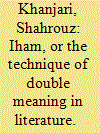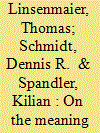| Srl | Item |
| 1 |
ID:
192994


|
|
|
|
|
| Summary/Abstract |
This article examines the chapter on īhām (literary amphiboly) in Ḥadāʾiq al-Siḥr by Rashīd Vaṭvāṭ (d. 1182). Ḥadāʾiq, a treatise on stylistics with Persian and Arabic examples, is the oldest extant document to define īhām. Vaṭvāṭ's definition of īhām sheds light on the mechanism and function of this literary technique. This article argues that īhām, according to Vaṭvāṭ, operates through the creation of semantic fields and defamiliarization. Previous scholars who examined this chapter of Ḥadāʾiq, oblivious to this point, have made a number of misinterpretations. However, by analyzing the name he prefers for this figure of speech, the definition he gives, and the examples he cites to explain it, this article demonstrates that Vaṭvāṭ had this function of defamiliarization in mind.
|
|
|
|
|
|
|
|
|
|
|
|
|
|
|
|
| 2 |
ID:
180351


|
|
|
|
|
| Summary/Abstract |
This article offers a new conceptualisation of the meaning of norms in world politics. It starts from the observation that existing norm scholarship in International Relations has underestimated the role of ambiguity in the constitution of norm meaning. To address this shortcoming, we advance a conceptualisation that sees norm polysemy – the empirically observable plurality of norm meanings-in-use – as resulting from the enactment of inherently ambiguous norms in different contexts. By foregrounding norm ambiguity, this view offers a radically non-essentialist understanding of norm meaning, one that eschews any attempt to salvage final or ‘true’ meanings behind the polysemy of norms. Using empirical illustrations from different fields of contemporary global governance, we identify four mechanisms through which actors practically cope with the multiplicity of norm meanings that arises from norm ambiguity (deliberation, adjudication, uni- or multilateral fixation attempts, and ad hoc enactment) and outline their varying effects on the legitimacy and effectiveness of global governance. Based on this discussion, the article points to the normative implications of a radically non-essentialist conception of norms and suggests harnessing the positive potential of norm ambiguity as an ethically desirable condition that promotes human diversity and the plurality of global life.
|
|
|
|
|
|
|
|
|
|
|
|
|
|
|
|